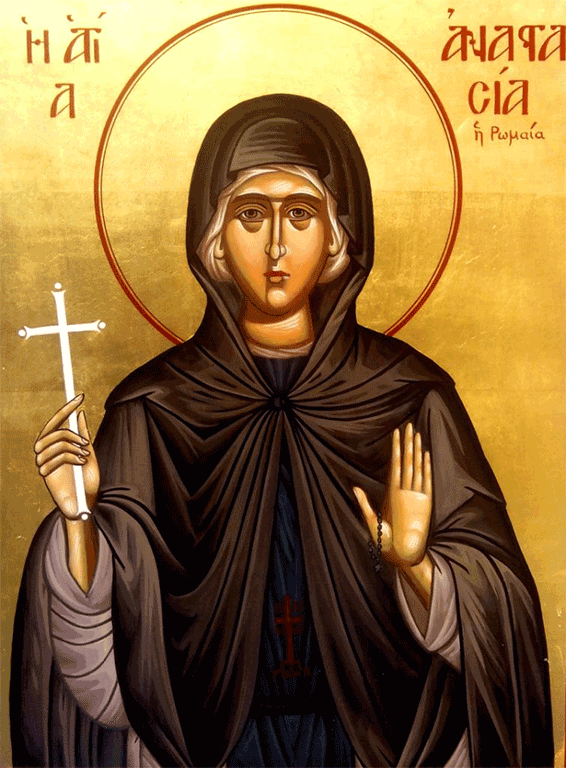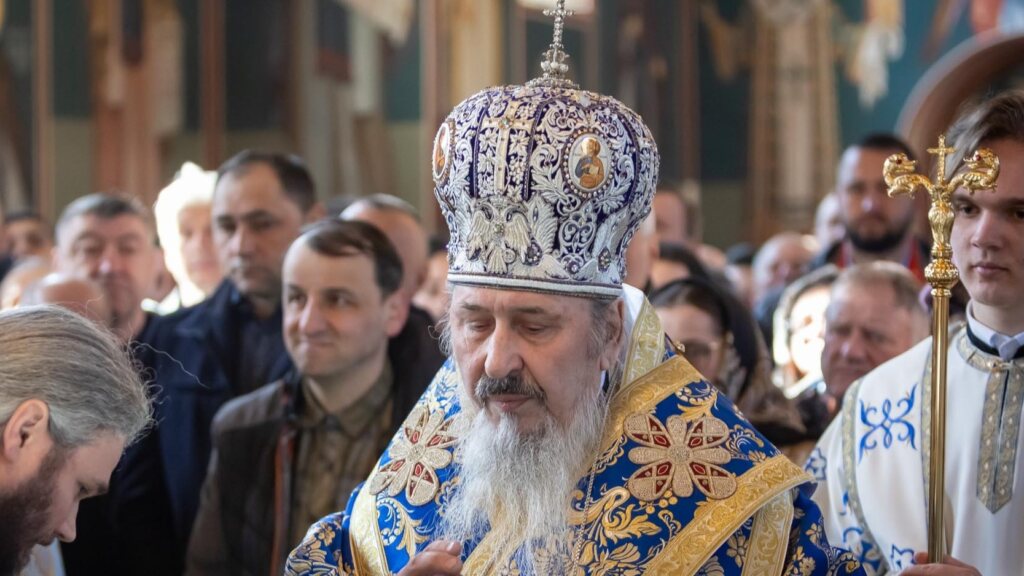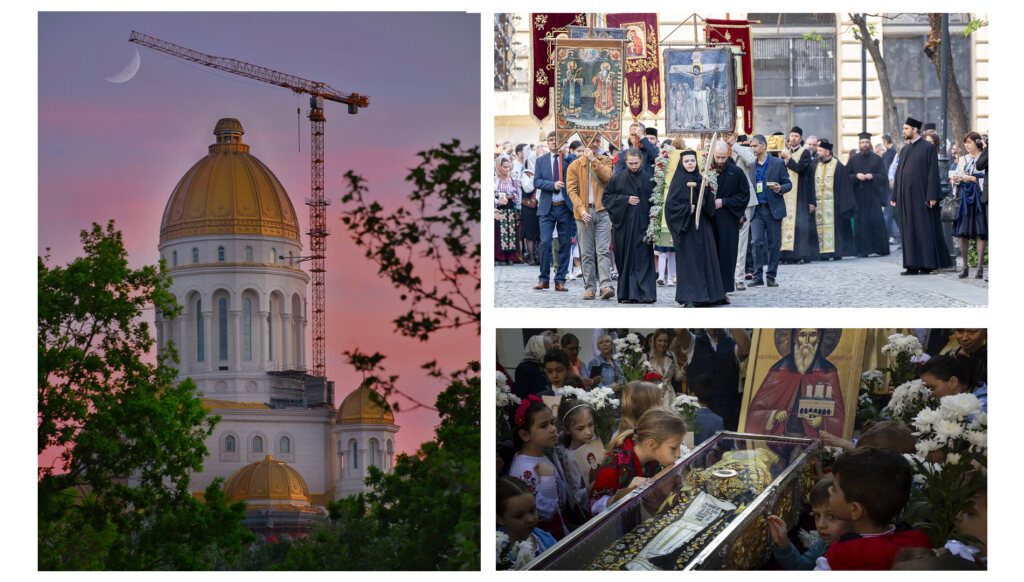Martyr Anastasia the Roman
She lost her parents in infancy, and was then taken to be reared by the abbess of a women’s monastery, named Sophia. She raised Anastasia in fervent faith, in the fear of God and obedience.
The persecution against Christians by the emperor Decius (249-251) began at that time. The city administrator, Probus, on the orders of the emperor commanded that Anastasia be brought to him. Blessed by her abbess to suffer for Christ, the young martyr Anastasia humbly came out to meet the armed soldiers. Seeing her youth and beauty, Probus first attempted flattery to make her deny Christ.
“Why waste your youth, deprived of pleasure? What is there to gain by enduring tortures and death for the Crucified? Worship our gods, marry a handsome husband, and live in glory and honor.”
The saint steadfastly replied, “My spouse, my riches, my life and my happiness are my Lord Jesus Christ, and you will not turn me away from Him by your deceit!”
Probus subjected Anastasia to fierce tortures. The holy martyr bravely endured them, glorifying and praising the Lord. In anger the torturers cut out her tongue.
The people, seeing the inhuman and disgusting treatment of the saint, became indignant, and the ruler was compelled to end the tortures by beheading the martyr. In this manner, Saint Anastasia received the crown of martyrdom.
The body of the saint was thrown out beyond the city to be eaten by wild animals, but the Lord did not permit her holy relics to be dishonored. At the command of a holy angel, Abbess Sophia went to find Saint Anastasia’s mutilated body. With the help of two Christians, she buried it in the earth.
Troparion — Tone 4
Your lamb Anastasia, calls out to You, O Jesus, in a loud voice: / “I love You, my Bridegroom, and in seeking You I endure suffering. / In baptism I was crucified so that I might reign in You, / and I died so that I might live with You. / Accept me as a pure sacrifice, / for I have offered myself in love.” / Through her prayers save our souls, since You are merciful.
Saint Abramius the Hermit and Blessed Maria, his niece of Mesopotamia
They lived the ascetic life in the village of Chidan, near the city of Edessa. They were contemporaries and fellow countrymen of Saint Ephraim the Syrian (January 28), who afterwards wrote about their life.
Saint Abramius began his difficult exploit of the solitary life in the prime of youth. He left his parents’ home and settled in a desolate wilderness place, far from worldly enticements, and he spent his days in unceasing prayer.
After the death of his parents, the saint refused his inheritance and requested his relatives to give it away to the poor. By his strict ascetic life, fasting, and love for mankind, Abramius attracted to him many seeking after spiritual enlightenment, prayer and blessing.
Soon his faith was put to a serious test, as he was appointed presbyter in one of the pagan villages of Mesopotamia. For three years, and sparing no efforts, the saint toiled over the enlightenment of the pagans.
He tore down a pagan temple and built a church. Humbly enduring derision and even beatings from obstinate idol-worshippers, he entreated the Lord, “Look down, O Master, upon Your servant, hear my prayer. Strengthen me and set Your servants free from diabolical snares, and grant them to know You, the one true God.”
The zealous pastor was granted the happiness to see the culmination of his righteous efforts: the pagans came to believe in Jesus Christ, the Son of God, and Saint Abramius baptized them himself.
Having fulfilled his priestly duty, Abramius again withdrew into his wilderness, where he continued to glorify God, and doing His holy will. The devil, put to shame by the deeds of Saint Abramius, tried to entrap him with proud thoughts.
Once at midnight, when Saint Abramius was at prayer in his cell, suddenly a light shone and a voice was heard, “Blessed are you, Abramius, for no other man has done my will as you have!” Confuting the wiles of the enemy, the saint said: “I am a sinful man, but I trust in the help and grace of my God. I do not fear you, and your illusions do not scare me.” Then he ordered the devil to depart, in the name of Jesus Christ.
Another time, the devil appeared before the saint in the form of a youth, lit a candle and began to sing Psalm 118/119, “Blessed are the blameless in the way, who walk in the law of the Lord.” Perceiving that this also was a demonic temptation, the Elder crossed himself and asked, “If you know that the blameless are blessed, then why trouble them?”
The temper answered, “I provoke them in order to conquer them and turn them away from every good deed.” To this the saint replied, “You gain victory over those who, like yourself, have fallen away from God. You are forced to vanish, like smoke in the wind, from before the face of those who love God.” After these words the devil vanished. Thus Saint Abramius defeated the Enemy, being strengthened by divine grace. After fifty years of ascetic life, he peacefully fell asleep in the Lord.
 Saint Abramius’s niece, the Nun Maria, grew up being edified by his spiritual instruction. Her father died when she was seven, and so she was raised by her saintly uncle. But the Enemy of the race of man tried to turn her from the true path. At twenty-seven years of age she fell into sin with a man.
Saint Abramius’s niece, the Nun Maria, grew up being edified by his spiritual instruction. Her father died when she was seven, and so she was raised by her saintly uncle. But the Enemy of the race of man tried to turn her from the true path. At twenty-seven years of age she fell into sin with a man.
Thoroughly ashamed, she left her cell, went to another city and began to live in a brothel. Two years later, when he learned of this, Saint Abramius clad himself in soldier’s garb, so that he should not be recognized, and he went to the city to find his niece. Pretending to be one of her “clients,” he revealed his identity once they were alone. With many tears and exhortations, he brought her to repentance and took her back to her cell.
Saint Maria returned to her cell and spent the rest of her days in prayer and tears of repentance. The Lord forgave her and even granted her the gift of healing the sick. She died five years after Saint Abramius.
Troparion — Tone 1
The image of God was truly preserved in you, O Father, / for you took up the Cross and followed Christ. / By so doing you taught us to disregard the flesh for it passes away / but to care instead for the soul, since it is immortal. / Therefore your spirit, venerable Abramius, rejoices with the angels.
Tr by oca.org






